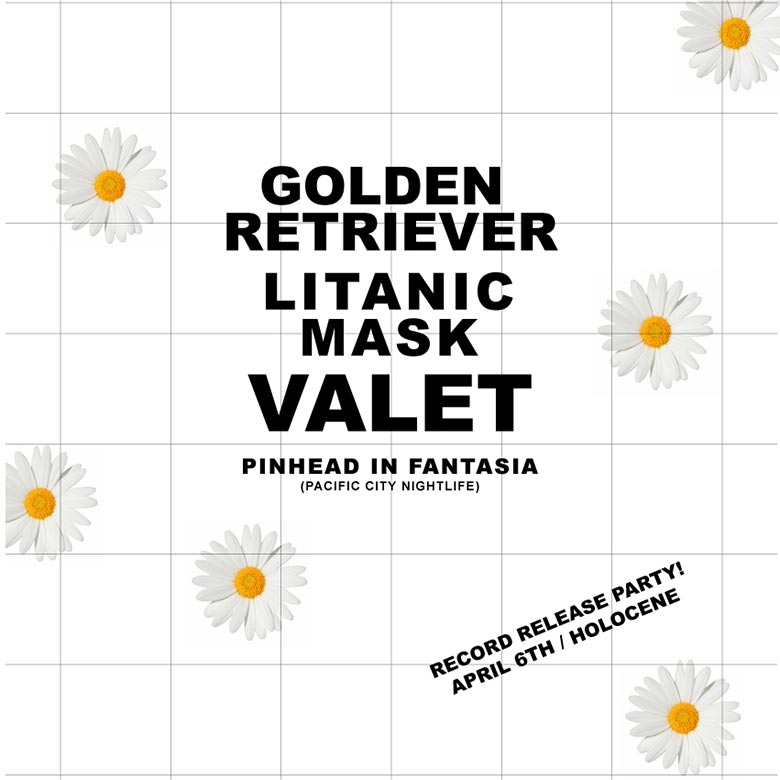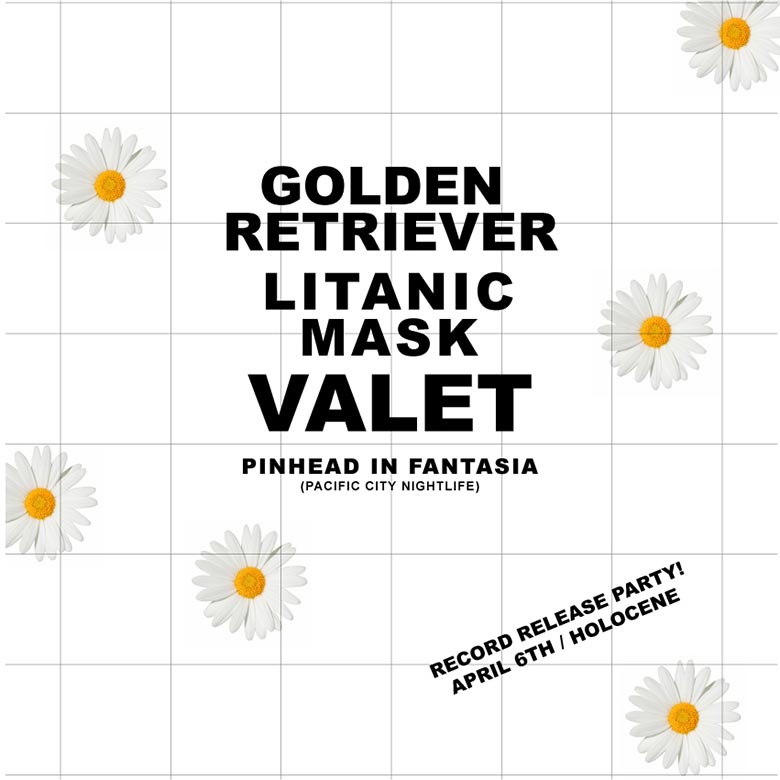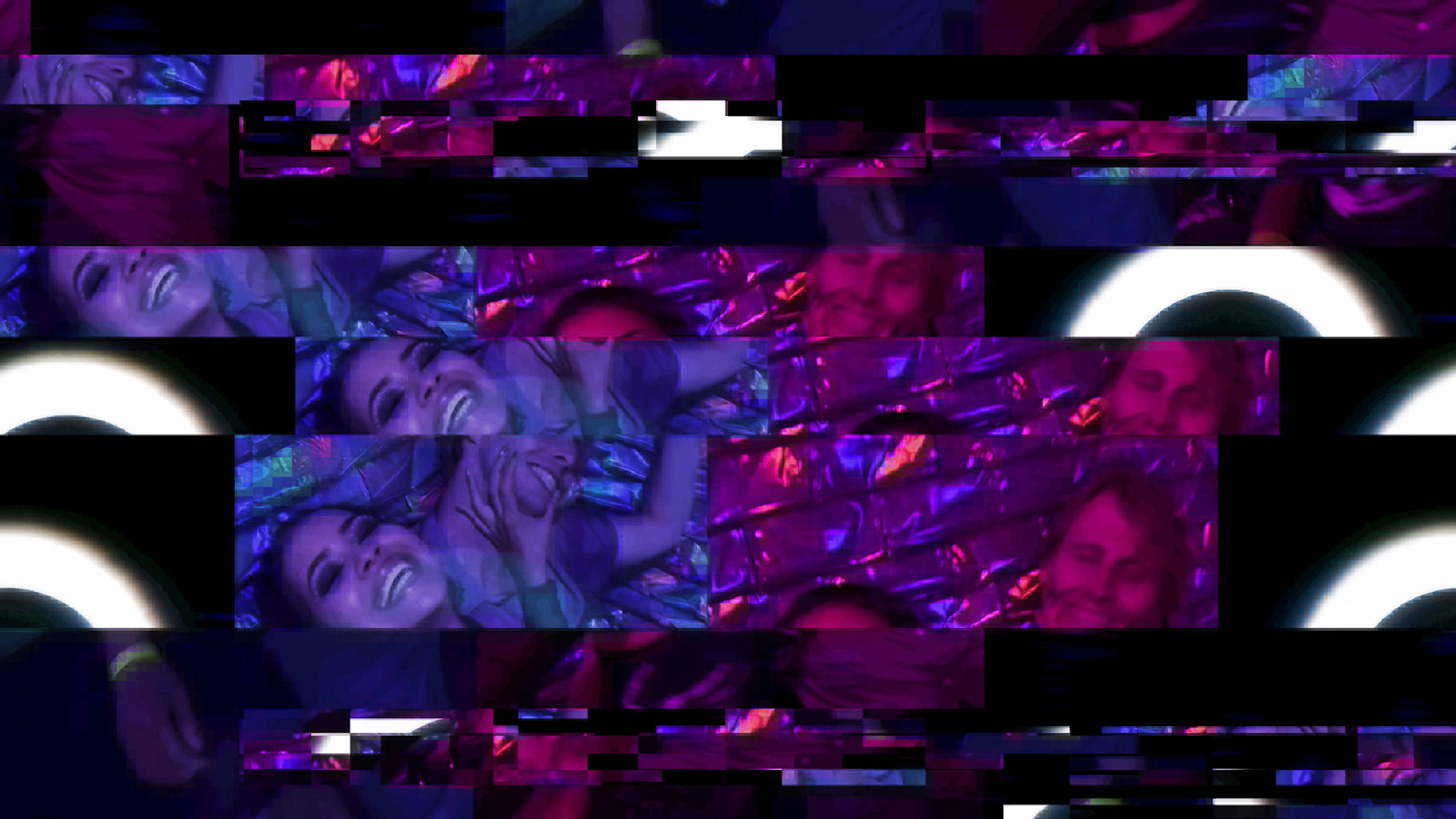There has always been a divide between the daytime and the night — a war between Saturday night and the Sunday morning penitents. Since the beginning of time, people have gathered in caves and juke joints and space stations to dance and dream and make believe in dim light. It makes it hard to wake up in the morning, and do what we’re told, but it’s important. We can’t ALL fall in line — what a boring, beige reality!
On this Sunday night, near the bowels of industrial SE Portland, four very different and special noisemakers gathered to lead a black-clad audience into four very different worlds. From tropical fantasy, to a tent in Marco Polo’s desert, to a freeway underpass — all ultimately arriving at the future.

Pinhead in Fantasia
Famous noise experimenter, improviser, and local treasure Spencer Clarke (The Skaters, Monopoly Child Star Searchers), here playing under the name Pinhead in Fantasia, opened things off with his brand of unique tropicalia, playing a stack of vintage keyboards to evoke a kind of electric gamelan — all rainbow arpeggios, thunderous primal percussion, twittering birds and electric harpsichord. His music is pure filigree, like J. S. Bach with no particular place to go, interpreting and re-arranging themes and variations ad infinitem. This is music to turn on and drift off to, to have light beatific conversations about deep and trivial matters. But every once in a while, the Zen garden grows fangs, and the jungle steps forward; chanting voices and ringing timpani cast a Stravinsky shadow over the proceedings, and we are transported back into the Mesozoic era.
Spencer Clarke is of the tradition of classic synthesists like Klaus Schulze, Hans Joachim-Rodelius, or even contemporary classicists like Oneohtrix Point Never in that he is a really good keyboardist and a great improviser. He also unleashes the synthesizer as the ultimate portable symphony-in-a-box, playing 5 instruments at once, with complete control of his tonality. He knows what he’s doing, but just so happens to be compelled to write weird, tropical symphonies.
Appropriately, he performed against a backdrop of a faceless woman, standing next to a black-and-white portrait in the midst of a dense jungle, producing a very disorienting, “WTF is going on?” sensation. I was reminded of colorful flora growing through polished steel and chrome, while a snake charmer played an onyx flute in the distance.
</p
Valet
Things dried up quite a bit as Valet, playing a rare Portland set, took us to the desert. Valet, aka Honey Owens (Miracles Club), has been a fixture of the experimental Portland scene for over 10 years, playing with influential noisemongers like Dark Yoga and Jackie-O Motherfucker. Valet’s ringing post-rock guitars and dub bass creates a stoner vortex, a hashish groove, as Owens plays the part of sorceress and oracle, with wordless reverbed vocals soaring over the bedrock grooves. This is music for bellydancing, a disco ball trance. The sound of following a mirage over the sand dunes, endlessly questing, seeking a more meaningful life. Valet’s set was a fine greeting of the warm weather, the breaking of the gloom, the coming of the spring.
Litanic Mask
Litanic Mask make a blend of witch house and synthpop, with dirty lo-fi synth bass meets drum machines, and a white-clad singer shimmers like a disco apparition in front, like the Ghost Of Cocaine Benders Past, her voice miles away. 1980 is calling, but it’s hard to hear, with a lot of days and ideas between then and now. Litanic Mask open a doorway into the Eternal Nightclub, where black-clad hipsters writhe under the stars since the dawn of time.
All of Litanic Mask’s equipment is run through a battery of guitar pedals that dirties things up, giving the proceedings a handmade quality — a feeling that you are witnessing something special that solves the dilemma of live electronic music, which often features some mannequin pressing play on their bedroom productions. They give you something to watch. Some of the audience seemed unimpressed, but they can go to hell, as I was quite under Litanic Mask’s spell. My only beef is their drum machines were a bit loud and sharp, breaking the opiated transmission that it seems like LM are going for.
Golden Retriever
Only had a chance to see a portion of infamous Portland synth and bass clarinet duo Golden Retriever, which was too bad, as I’ve been transported by their album Seer quite a bit lately — but I saw enough to get the jist. Where the previous bands were re-arranging bits of the past, and far-off, exotic cultures, Golden Retriever is rooted firmly in the future. If I had to put one image to their overall aesthetic, it would be the sun rising over the curvature of the Earth, as viewed from the moons of Jupiter. This is most likely due to the sweet, sweet analog modular synthesizer of Matt Carlson.
Golden Retriever take the freedoms of electronic innovation and blend them with the spontaneity of free jazz, as well as the nuance and detail of classical music. Not only are GR breaking down the traditional musical narratives, but they are also pushing the limits of their instruments, as Jonathan Sielaff’s bass clarinet is run through a host of signal processors to at times become a soaring electric guitar, sometimes a geologic rumbling. I am hoping that more people will hear and pay attention to this, as a number of “classical instruments”, and particularly the bass clarinet, are rich, warm and full of complex harmonics. A lot of people don’t realize the bass clarinet is one of the most rock ‘n roll instruments out there, and Jonathan Sielaff is one of a handful of people working to correct that ignorance.
Ω






